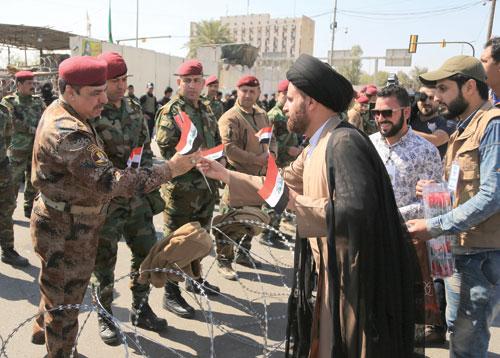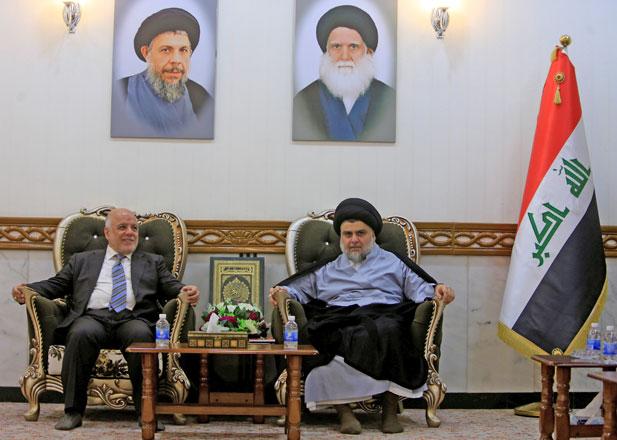You are here
Iraq's Abadi in high-stakes plan to rein in Iranian-backed militias
By Reuters - Jan 04,2018 - Last updated at Jan 04,2018
BAGHDAD — Under pressure from allies in the West, Iraqi Prime Minister Haider Al Abadi is staking his career on reining in the Shiite militias that helped him defeat the Daesh terror group.
The task will not be easy. The paramilitaries, or Popular Mobilisation Forces (PMF), are mostly trained and backed by Iran, so Abadi risks angering his most powerful regional backer.
Iraq's Shiite majority also see the PMF's 150,000 fighters as their saviours. Several militia commanders plan to run against Abadi in parliamentary elections in May and some have warned they will resist attempts to dismantle them.
Abadi's plan envisages taking back the militias' heavy weapons and cutting their strength by half, according to military and intelligence sources.
The army is already taking an inventory of PMF weaponry, such as the armoured vehicles and tanks the government gave them to fight Daesh.
Next, Abadi will order his military and police commanders to take back those heavy weapons under the pretext of repairing them.
The defence ministry will then remove over-age or physically unfit fighters, two military sources said.
“The plan will be implemented with extreme caution and precision in order to prevent a negative backlash from the PMF commanders,” said an army colonel who was briefed on it by his commander. “We can’t keep a second army within one state; this is the key objective of the plan.”
The plan will be closely followed by Iran and the United States. The groups are one of Iran’s many levers of influence in Iraq, while for Washington they are a reminder of Tehran’s growing reach in the Middle East.
Lawmakers close to Abadi and one of his political advisers say he is coming under “tremendous pressure” from the West and Sunni regional allies to dissolve the PMF now that Daesh is no longer a major threat.
“Prime Minister Abadi is getting messages from allies in the war against Daesh encouraging him to dismantle the PMF as a condition to keeping their support flowing in future,” the adviser said on condition of anonymity.
In a phone call last month, French President Emmanuel Macron encouraged Abadi to dismantle the PMF, said the adviser, who was briefed on the call.
With Daesh crushed in Iraq, Abadi will find it harder to avoid clamping down on the militia, according to a lawmaker from his Dawa Party.
“Abadi would respond to pressure from his Western and Gulf allies to dissolve the PMF by saying he needs them to fight Daesh, but now Daesh is finished and there are no more excuses to keep the PMF,” the lawmaker said.
In any case Abadi does not trust the Iranians, whose militia allies act like a state within a state, said a Shiite lawmaker close to the prime minister.
“Abadi sees the support of the West, the United States and regional Arab states as indispensable in making Iraq more stable in future,” the lawmaker said.
But militia commanders, such as Ali Al Hussaini from the Imam Ali Brigades, say the PMF played a major part in defeating Daesh and dismantling them would be a “big mistake”.
“We have millions of followers who will defend our rights against any attempt to target us,” he said.
Nonetheless, a joint committee from the army, police, and intelligence services will review the number of PMF fighters and make recommendations to Abadi, who will decide who will stay and who will be retired, said a military intelligence colonel who is close to the military chief of staff’s office.
Abadi would also order his commanders to restructure their own forces.
Another army colonel said taking heavy weapons from the militias would not be easy, as they control hundreds of headquarters, arms stockpiles, camps, and even small rocket factories.
Iranian influence
Disarming the militias is one of Abadi’s most delicate challenges. They are generally more effective than the Iraqi security forces and often defy Baghdad with the support of Tehran.
They also have the blessing of Iraq’s most influential Shiite cleric, Grand Ayatollah Ali Al Sistani.
Iraqi Shiite militia commanders are openly loyal to Tehran, Iranian advisers are seen on Iraqi battlefields, and Iran’s Supreme Leader, Ayatollah Ali Khamenei, warned Abadi in June against weakening the militias.
The PMF gained prominence after Sistani called on Iraqis to take up arms against Islamic State when it seized a third of the country in 2014.
Since then the militias have become more assertive, riding around cities in vehicles flying their own flags. They are accused of terrorising minority Sunnis, which they deny.
Security sources and analysts say any attempt by Abadi to muzzle the PMF could invite a backlash from Shiites, who expect the militias to protect them in the event of renewed sectarian conflict in Iraq.
Any backlash could lead to the election of an alliance of Iranian-backed political parties to enough seats in parliament to end Abadi’s bid for a second term.
Abadi’s success against Daesh and in quashing a Kurdish bid for independence in Iraq may tempt him into over-confidence in acting against the militias, said Jasim Al Bahadli, a Baghdad-based expert on Shiite armed groups.
“Playing hard with the PMF could be a double-edged sword; they have broad popularity that Abadi should not underestimate.”
Fiery cleric
To counter the PMF’s popularity, Abadi has turned to the cleric Moqtada Al Sadr, who once led an armed rebellion against US occupation forces and was named the most dangerous man in Iraq by the Pentagon.
The pair held a secret meeting in the holy Shiite city of Karbala on November 11 to discuss Sadr helping the government disarm the militias, accoording to aides for both men who attended the meeting.
Sadr sees the militias as a threat to his role as a kingmaker in Iraq’s turbulent politics.
During their meeting, Abadi asked Sadr to support him in his bid to “cleanse the country” of corrupt politicians and those who might try to use armed groups to influence the election, an adviser to Sadr said.
“They talked about putting an end to the militias operating above the law, fighting corruption, and of course supporting Abadi’s bid to be prime minister for a second term,” he said.
Several lawmakers close to Abadi and sources close to Sadr said the prime minister had secured the cleric’s support to stop the PMF interfering in the election.
“Sadr can put hundreds of thousands on the streets in solidarity with Abadi with one call, he would make Abadi’s opponents think twice before challenging him,” said a senior Shiite politician close to Sadr.
Indeed, Sadr plans to do just that in the very near future, another source close to him said.
Strong challenger
Sources close to Sadr said he also promised to persuade Sistani to support Abadi’s plans to restrain the militias.
That could give Abadi an edge over the militias, which comprise more than 66 groups, over 40 of which are backed by Iran, according to security sources and analysts.
It would also put Abadi in a strong position against one of his main challengers, Hadi Al Amiri, who commands Iraq’s largest Iranian-backed Shiite militia, the Badr Organisation.
“Badr will lead the PMF list in next election under the leadership of Hadi Al Amiri,” said Ameer Al Kinani, a Sadrist adviser to Iraqi President Fuad Masum. “This is known to all.”
Related Articles
BAGHDAD — With Iraq's politicians tainted by corruption and the army's standing hurt by battlefield defeats, two Shiite clerics have re-emer
BAGHDAD — Iraqi lawmakers who met this week for the first time since a May election and are still struggling to form a new government, decid
NAJAF/BAGHDAD — Prime Minister Haider Al Abadi and cleric Moqtada Al Sadr said their political blocs would enter into an alliance, bringing


















